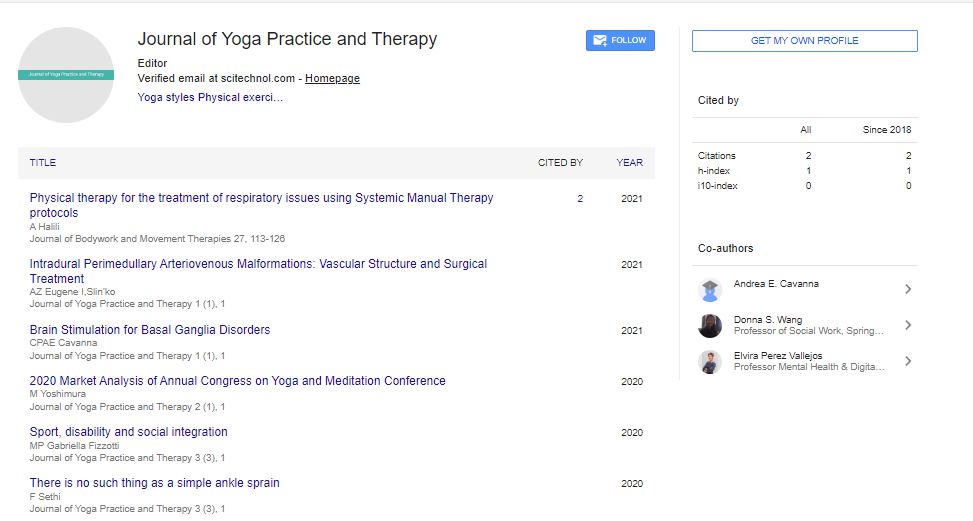Perspective, Vol: 6 Issue: 1
Enhancing Pregnancy Wellness: A Comprehensive Guide to Prenatal Yoga and Physiotherapy
Andreas Michalsen*
Department of Internal and Integrative Medicine, Immanuel Hospital Berlin, Germany
*Corresponding Author: Andreas Michalsen
Department of Internal and Integrative Medicine, Immanuel Hospital Berlin, Germany
E-mail: andreas.michalsen@charite.de
Received date: 27 February, 2023, Manuscript No JYPTY-23-95009;
Editor assigned date: 01 March, 2023, Pre QC No. JYPTY-23-95009(PQ);
Reviewed date: 15 March, 2023, QC No. JYPTY-23-95009;
Revised date: 22 March, 2023, Manuscript No. JYPTY-23-95009(R);
Published date: 29 March, 2023, DOI: 10.4172/jypty.1000109
Citation: Michalsen A (2023) Enhancing Pregnancy Wellness: A Comprehensive Guide to Prenatal Yoga and Physiotherapy. Int J Yoga Therap 6:1.
Description
Pregnancy is a transformative journey that involves physical, emotional, and mental changes. Prenatal yoga and physiotherapy are two complementary approaches that can promote overall wellness during pregnancy, addressing the unique needs of expectant mothers. In this manuscript, we provide a comprehensive guide to understanding and implementing prenatal yoga and physiotherapy as a holistic approach to enhance pregnancy wellness. We review the benefits, safety considerations, and evidence-based practices of prenatal yoga and physiotherapy, highlighting their synergistic effects in supporting maternal health and fetal development. We also explore the physiological changes that occur during pregnancy and how prenatal yoga and physiotherapy can address common discomforts such as back pain, pelvic floor dysfunction, and postural imbalances. Practical guidelines for designing and implementing a prenatal yoga and physiotherapy program, including modifications for different trimesters, are provided. Furthermore, we discuss the role of mindfulness, breath awareness, and relaxation techniques in managing stress, anxiety, and emotional well-being during pregnancy. Lastly, we address potential contraindications, precautions, and limitations of prenatal yoga and physiotherapy, and provide recommendations for further research and professional collaboration. This manuscript serves as a valuable resource for healthcare providers, yoga instructors, physiotherapists, and expectant mothers who seek evidence-based guidance on how to optimize pregnancy wellness through prenatal yoga and physiotherapy.
Pregnancy is a remarkable journey that involves profound physiological, emotional, and psychological changes. As the body undergoes significant transformations to accommodate the growing fetus, expectant mothers may experience various discomforts such as back pain, pelvic floor dysfunction, and postural imbalances. These challenges can impact maternal health and well-being, and potentially affect fetal development. Prenatal yoga and physiotherapy are two complementary approaches that offer a holistic and evidence-based approach to promote pregnancy wellness by addressing the unique needs of pregnant women. Prenatal yoga combines physical postures, breath awareness, mindfulness, and relaxation techniques, while physiotherapy utilizes targeted exercises, manual therapy, and education to optimize physical function. In this manuscript, we provide a comprehensive guide to understanding and implementing prenatal yoga and physiotherapy as an integrated approach to enhance pregnancy wellness.
Benefits of prenatal yoga and physiotherapy
Prenatal yoga and physiotherapy have been shown to offer numerous benefits to expectant mothers. Physical benefits of prenatal yoga include improved flexibility, strength, and circulation, which can help to alleviate common discomforts such as back pain and swelling. Prenatal yoga also promotes proper alignment and posture, which can reduce the risk of musculoskeletal imbalances and injuries during pregnancy. Physiotherapy, on the other hand, focuses on optimizing physical function through targeted exercises that address specific musculoskeletal issues, such as pelvic floor dysfunction and diastasis recti. In addition, physiotherapy provides education on posture, body mechanics, and ergonomics to prevent and manage pregnancy-related discomforts.
In addition to physical benefits, prenatal yoga and physiotherapy also promote emotional and mental well-being. Pregnancy can be a time of heightened stress and anxiety, and prenatal yoga and physiotherapy provide tools for managing these challenges. Mindfulness, breath awareness, and relaxation techniques, which are integral components of prenatal yoga, can help to reduce stress, improve mood, and enhance overall emotional well-being. Physiotherapy, with its focus on proper body mechanics and ergonomics, can also improve self-confidence and body awareness, which are important aspects of emotional well-being during pregnancy.
 Spanish
Spanish  Chinese
Chinese  Russian
Russian  German
German  French
French  Japanese
Japanese  Portuguese
Portuguese  Hindi
Hindi 